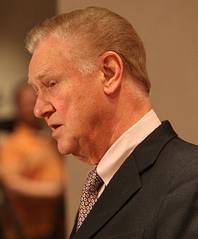Wednesday, Aug. 19, 2009 | 2 a.m.

Walt Rulffes
Sun Coverage
Sun Archives
Beyond the Sun
William Trent, an expert in education policy, helps school districts across the country deal with issues of segregation, equity and student achievement.
Trent, a professor at the University of Illinois, says it’s easy to get people talking about what’s not working and whom to blame.
That’s what is happening in Clark County.
The harder step, and the more important one, Trent says, is the listening.
In one district where Trent has been consulting, it’s taken three years for all sides to move beyond “the pretense of conversation, with no real listening going on … to real engagement,” Trent recently told the Clark County School Board. “It’s indicative of the kind of things that happen when you go decades without having any of these needs addressed … how difficult the bridge is to build, to reestablish that trust.”
To be sure, the gulf between the West Las Vegas community and the School District has widened, after an independent review of a School District policy that was intended to improve student achievement in West Las Vegas. Based on raw data, that policy has accomplished little, according to the study by Trent and others.
The policy, adopted in 1994 when the district was phasing out a federally mandated busing program, calls for students in six West Las Vegas schools to be bused to other schools as a way to promote voluntary diversity. The students could decline the offer and attend either their neighborhood schools — which became known as the Prime Six — or apply for one of three nearby magnet schools.
The recent study by researchers with the Civil Rights Project at UCLA — the most comprehensive review yet of the 15-year-old program, and done at the district’s request — found that the parents of most students kept their children at the neighborhood schools — and that, isolated by race and poverty, they were performing significantly more poorly than other district students.
Students who opted to be bused to outlying campuses did better academically than their peers who stayed at the neighborhood campuses.
Few eligible families took advantage of the option to apply to one of three neighborhood magnet schools.
Parents are now complaining that there was only cursory oversight of the Prime Six plan and the district has allowed their neighborhood schools to fall into disrepair, while their children’s educational opportunities languish.
At issue is where the district goes from here.
The hostile tone of comments made at public meetings reflects “the emotions of people who want community schools that offer no less than what you can get in more affluent areas,” Clark County Schools Superintendent Walt Rulffes told the Sun. “We have to make sure they have equitable opportunities right in their own neighborhood.”
Rulffes said he plans to follow Trent’s recommendation to bring in expert help to develop a course of action, which might include expanding popular magnet programs in West Las Vegas. Rulffes wants to have several options for consideration when the School Board meets Sept. 10.
At a minimum the district needs to set up focus groups, surveys and roundtables to start gathering public input, and find out from parents what options and opportunities might improve diversity in the West Las Vegas schools, Rulffes said. The principals of the Prime Six schools are going to be an important part of those discussions, Rulffes said.
But before those focus groups convene, there might need to be a return to civility. At the last meeting, School Board member Deanna Wright was reduced nearly to tears after West Las Vegas activist Marzette Lewis, one of the district’s sharpest critics, heckled her comments. Lewis had suggested earlier in the meeting that the School Board members were motivated by money, and not what’s best for students.
After asking Lewis several times to stop interrupting her, Wright’s voice rose several notches: “You need to leave if you can’t be quiet when other people speak,” she told Lewis. “I am tired of listening to you!”
Indeed, there’s a bridge to be built.
Emily Richmond can be reached at 259-8829 or at [email protected].

Join the Discussion:
Check this out for a full explanation of our conversion to the LiveFyre commenting system and instructions on how to sign up for an account.
Full comments policy